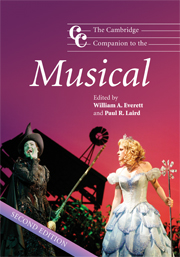Book contents
- Frontmatter
- Part I Adaptations and transformations: before 1940
- Part II Maturations and formulations: 1940–1970
- 7 ‘We said we wouldn't look back’: British musical theatre, 1935–1960
- 8 The coming of the musical play: Rodgers and Hammerstein
- 9 The successors of Rodgers and Hammerstein from the 1940s to the 1960s
- 10 Musical sophistication on Broadway: Kurt Weill and Leonard Bernstein
- Part III Evolutions and integrations: after 1970
- Part IV Legacies and transformations
- Notes
- Select bibliography
- Index
7 - ‘We said we wouldn't look back’: British musical theatre, 1935–1960
from Part II - Maturations and formulations: 1940–1970
Published online by Cambridge University Press: 28 September 2011
- Frontmatter
- Part I Adaptations and transformations: before 1940
- Part II Maturations and formulations: 1940–1970
- 7 ‘We said we wouldn't look back’: British musical theatre, 1935–1960
- 8 The coming of the musical play: Rodgers and Hammerstein
- 9 The successors of Rodgers and Hammerstein from the 1940s to the 1960s
- 10 Musical sophistication on Broadway: Kurt Weill and Leonard Bernstein
- Part III Evolutions and integrations: after 1970
- Part IV Legacies and transformations
- Notes
- Select bibliography
- Index
Summary
Between the early Edwardian musical comedies of the Gaiety Theatre and the recent megamusicals of Andrew Lloyd Webber is a largely forgotten era in the history of the British musical of some twenty-five years. Between 1935 and 1960, 127 new British musicals were presented in the West End, but only a handful have survived into today's active repertory. Me and My Girl (1937; music by Noel Gay) was neglected for decades until it received a major London revival in 1984 and successfully transferred to Broadway. The Boy Friend (1953–4; Sandy Wilson), itself a tribute to an earlier style of show, has achieved an international prominence while Salad Days (1954; Julian Slade) has found popularity predominantly in Britain. Some individual songs from shows of this period are still favourites in the light music repertory – particularly those by Ivor Novello and Noël Coward – but almost always the songs have been divorced from any knowledge of the original shows. Based on this scant evidence, any view of British musical theatre in the mid-twentieth century is likely to be strange.
So what happened to all of the other shows? Why did most of them never receive more than one original professional production? Were they really so bad as to be better forgotten or did other factors lead to their neglect? This chapter will look at the major works of the period and provide some answers as to why this part of the British musical theatre has been and continues to be largely ignored.
- Type
- Chapter
- Information
- The Cambridge Companion to the Musical , pp. 125 - 146Publisher: Cambridge University PressPrint publication year: 2008
- 2
- Cited by



